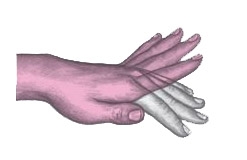Origin
Propriospinal myoclonus (PSM) is a rare type of spinal myoclonus characterized by muscle jerks that usually start in the midthoracic segments and then slowly propagate up and down into the spinal cord, resulting in repetitive and irregular jerky flexion, or extension of the trunk, neck, knees and hips.
Classification
The first description of a spinal-generated myoclonus was confined to muscles innervated by a few adjacent spinal segments and reported as a rhythmic movement persisting in sleep associated with focal spinal pathology.
PSM appeared only during relaxed wakefulness preceding sleep and at the sleep wake transition (stage 1 sleep).
The majority of cases of PSM are functional.
Clinical Features
The movement seems to be position-dependent, recurring more frequently when the patient is lying down and disappearing or subsiding when standing or walking.
Various sensory warnings have been reported preceding the jerks, mainly sensations such as tingling at the back of the neck or a shock-like internal sensation.
SImilarlly to other forms of myoclonus, PSM may be stimulus sensitive.
Age of onset
Although many reports were in middle aged men initially, the majority of functional cases have been seen in younger women.
Distribution
Diagnosis:
The initial muscle burst is typically in the upper rectus abdominis muscles; adjacent muscles are activated slowly (3-13 m/s) and burst duration ranges from a few hundred to a few thousand ms. More rapid propagation has been observed when volunteers reproduced the movement voluntarily, as has synchronous flexion and extension.
Although a clear lesion has been seen on MRI in some cases, the causal link remains speculative in many patients. Even among the cases with a clear spinal lesion, a clear correspondence between the spinal generator level and the level of the abnormalities detected by neuroimaging has only been reported in two cases.
Differential Diagnosis
Diagnostic Tests
Treatment

